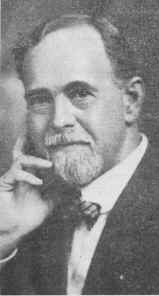|
Rev. John H. Bates
|
||
|
Mercer County biography
|
John H. Bates.
By any of the principles of biography
this writer ought to pen a concise sketch of the life of the Rev.
John H. Bates, close intimacy from boyhood, beginning as the family
pastor, continued unbroken through the checkered years and was intensified by his
gracious words at the marriage altar, and later at the funeral of the
bride, followed by the same office at the grave of my mother, in turn to
be followed by my ministrations at the grave of his wife.
continued unbroken through the checkered years and was intensified by his
gracious words at the marriage altar, and later at the funeral of the
bride, followed by the same office at the grave of my mother, in turn to
be followed by my ministrations at the grave of his wife.Yet within the limitations of this
paper it is very difficult to seize upon the principle features of his
life. The Rev. John
H. Bates was born in Lowell, Mass., Nov. 27, 1848, the only child
of John M. and Emily Blackman Bates. His
father had come from England to the Merrimac Printing Works, where he
introduced a printing method for making fine calico (perhaps his own
invention) a much better method than any be fore used in this country.
Left a widow when her son was seven years of age, his mother married again
and moved to Salem, Oregon, where his childhood and youth were spent. Very
early in life he showed a marked aptitude for public speaking and was considered
a coming speaker on the stump and in the pulpit even then. He attended Willamette university, a
Methodist institution. and was graduated from Mt. Union College and Boston
Theological Seminary. His life as a preacher began when he
was eighteen and continued while he was pursuing his collegiate and
theological studies. In 1873 he married Caroline
Phillips, daughter of Samuel Phillips,
of Mercer, Pa. Five children were born of this union:
Samuel P. Bates, now deceased; Emily B.
Ballard, of Long Beach, California; Madge B.
Horton, of Buffalo, N. Y.; Charles E. Bates,
of Cattaraugus, N. Y., and John H. Bates, Jr., of
Pasadena, California. He joined the Erie Conference after
serving churches at Franklin and Oil City, Pa., and served pastorates at
Leon, Westfield, Dunkirk, Mayville, Silver Creek, Meadville, Cattaraugus
and Sherman, N. Y., re tiring in 1905 on account of the ill health of his
wife. The last twenty years of his life were spent at Buffalo, during
which time he did considerable supply work. Mrs.
Bates died in 1920, leaving in his care his granddaughter, Alice
H. Bates, the daughter of his son, Samuel, for
whom he kept his home until his death on February 11th, 1926, which came
as the result of having been hit by a street car in Buffalo a few weeks
previously. Dr. Bruce S. Wright, of
Asbury-Delaware M. E. Church, Buffalo, N. Y., one of the Allegheny College
students who attended his church at Meadville, officiated, assisted by Dr.
Milton B. Pratt, District Superintendent, of the Buffalo District.
Interment was at Forest Lawn Cemetery, Buffalo. In the large sense
the immortal Elegy may be near the truth when Gray says, “Full
many a flower is born to blush unseen, And
waste its sweetness on the desert air.” Inasmuch as one of
the penalties of ministerial service for many is that rich talent, and
even genius, may be sacrificed on the altars of devotion to great causes
or principles, yet in this case we may take issue with the Elegist, ‘And
flowered sweetness never wasted where Its gorgeous beauty was by man
unseen, It lured the bee to pollenate the fair, And many grew where few
before had been.” He was an
exceptionally devout scholar and preacher, whose mind, even in retirement,
kept fresh and vigorous, demonstrating the fact in the extent and variety
of subjects covered by his library, that there is no retreat like a
cultivated mind. He was an amateur photographer of rare skill, and many
people in Western New York and Pennsylvania will remember his illustrated
lectures in the days when the stereoptican held the place the movie
occupies today. While pastor at
Silver Creek he wrote a book entitled, Christian Science and Its Problems,
said at the time of its publication, by the Outlook and Chicago
Inter-Ocean, to be an authority on the subject. The writer was
invited by him to assist in the correction of the proofs and thus well
knows the labor and research entering into that volume. We are destined to
treasure his memory, rejoice in his record, take pride in the keenness of
his intellect, his suave manners, his interest in life with all its vital
issues, his never-failing question, “What are you reading now ?“ is
indicative of all that is best in man, since he employed his well earned
leisure in the perfecting of his mind and heart, contrary to the custom of
many he thus died in the active ministry of pleasant helpfulness to all
who knew him. Servant of God,
well done. Written
by Herbert H. Clare. Memoirs of Deceased Preachers, Erie
Conference Journal and Yearbook, Ninety-first session, 1926, pages
602-604. |
